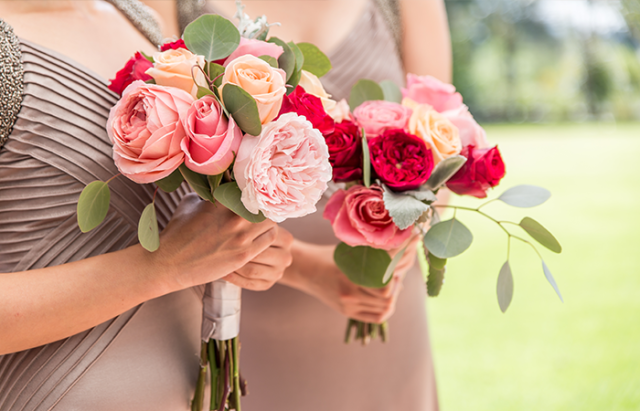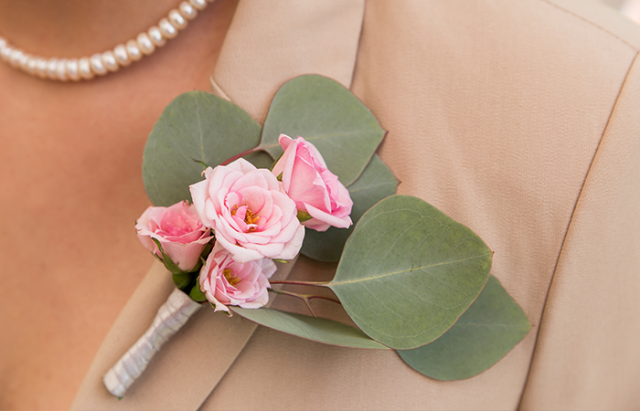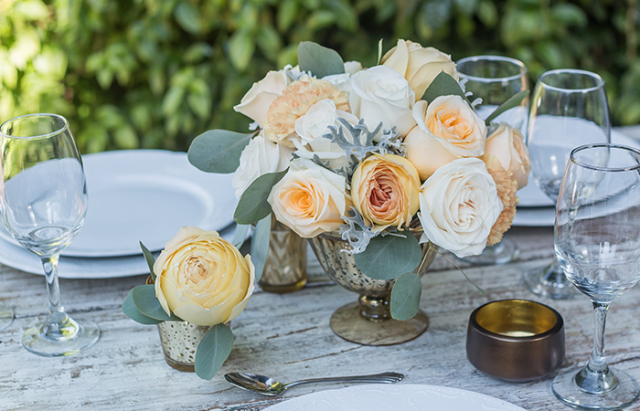Congrats, you’re getting married! There are a lot of things on your to-do list and figuring out your florals is one of them. Planning a wedding is a lot of work, and choosing your wedding flowers can be especially daunting. Today we’ll be covering a large variety of different topics and will hopefully answer any questions you have about flower arrangements for your special day!
What Kind of Floral Arrangements Do I Need for My Wedding?
First, let’s talk about the types of flowers you’ll need for your wedding and why. There will likely be a few things you weren’t sure you needed, so here’s a breakdown of the different types of flower arrangements used in weddings so you can decide what you might want or need.
Bridal Bouquet
The bridal bouquet is the bouquet you’d carry down the aisle. Often times the bride’s bouquet is bigger and sometimes even has different colors or flower varieties than other bouquets. The bridal bouquet is meant to stand out and accent your gown and wedding décor.
Bridesmaid Bouquets
Your bridesmaids hold bridesmaid bouquets as they walk down the aisle and in photos. They can also be used as the décor for the head table by being put into empty vases.
Boutonnieres
Corsages
Corsages are tiny bouquets of flowers that are either pinned to a women’s clothing or worn around her wrist. Generally, the mother or the bride and groom wear these.
Centerpieces
Floral centerpieces are a huge part of your reception décor. They really soften a space while adding color and texture to your venue and décor.
Bridal Hairpiece
There are tons of different hairstyles to consider wearing on your wedding day, and a lot of them include floral details. Having a gorgeous fresh floral hairpiece can really make a hairstyle pop.
How many arrangements do I need for my wedding size?

A small wedding will consist of 2-50 guests. They are intimate affairs where you will likely spend a lot of time with each guest attending. You’ll need anywhere from 2-5 centerpieces, plus 2-4 bridesmaid bouquets depending on your wedding party.
Medium weddings are classified as 50-175 guests. A good rule of thumb is to have a floral arrangement for every table at your reception. Depending on the amount of guests per table and number of guests, you’ll need approximately 5-15 centerpieces. You’ll also want to include a bouquet for each of your bridesmaids.
Large weddings are events with 175 or more guests. You’ll need at least 15 floral centerpieces for these weddings, plus bouquets for each of your bridesmaids.
How much should I expect to spend on wedding flowers?
Wedding flowers, on average, account for about 8% of your overall wedding budget according to The Knot. This number can vary greatly depending on the size, style, and venue of your wedding. A few other things can change the pricing of flowers, including if they’re in season, the size of the bouquets, and the variety of flowers used. The average cost per item is as follows.
Bridal Bouquets: $100-$150/each
Bridesmaid Bouquets: $50-$90/each
Corsages: $15-$20/each
Boutonnieres: $10-$15/each
Centerpieces: $50-$150/each
An easy way to make purchasing flowers less daunting is to consider purchasing a floral wedding package, like the ones we provide. We offer different sized packages, starting at $350. Besides saving money with our florals, we make the process of choosing the style and types of flowers you need for your wedding easier. Learn more here.
The 10 most popular flowers for weddings
Roses
Roses are popular because they are a well-known flower of romance. They’re a bit more expensive, but look great in every arrangement including boutonnieres and corsages. They also come in a ton of different colors which make them very versatile. Roses can add an extra dose of whimsy and elegance to your dream wedding with how magical they are.
Hydrangeas
Hydrangeas are used in a lot of centerpieces and bouquets because they are voluminous flowers and take up a significant amount of space. A lot of florists will use them to add fullness to their pieces. They are also stunning, which is another reason why they’re so popular. They add texture to your décor, which can really showcase the colors of your special day.
Peonies
Peonies have grown in popularity over the last few years, and rightfully so. They are gorgeous while adding texture to any arrangement. They also come in quite a few colors, which lends itself to many different wedding styles. Although they are a bit on the pricey side, they are fuller blooms meaning you won’t need as many to fill up a bouquet. The softness and delicateness of Peonies can add a subtle dose of romance to your big day.
Carnations
Carnations tend to show up in a lot of wedding floral arrangements because they are affordable and come in a plethora of shades. They add a nice amount of texture to your arrangements. A great way to save money is to supplement your monochromatic bouquet with a few carnations to take up some extra space.
Daisies
Daisies are traditional wedding flowers because of the amount of varieties and colors they come in. They have become increasingly popular for rustic and DIY weddings. They represent sharing your feelings, which is the perfect sentiment for your special day.
Ranunculus
These gorgeous blooms are perfect for weddings because they aren’t as common as roses, but are sometimes confused for them and even peonies. Check to make sure these are available and in season before getting your heart set on having ranunculus in your arrangements.
Baby’s Breath
Baby’s breath used to be a filler flower that would be included in bouquets and centerpieces simply to take up room, but recently they’re making a comeback of their own. They are very lightweight and affordable, meaning you can fill up your space without breaking the bank.
Stephanotis
These star-shaped waxy flowers grow on a vine and are very popular for boutonnieres and corsages. They make a statement with one simple flower. It doesn’t hurt that the meaning of this flower is ‘marital happiness.’
Alstroemeria (also known as Peruvian Lily)
These small flowers are very cost-effective and come in a few bright colors with freckled petals. They make gorgeous accents to any bouquet.
Tulips
Tulips mean love and passion, which are both very appropriate for a wedding flower. They are in season during the spring, which makes them the perfect choice for a spring wedding. They come in a lot of different varieties and colors and add a fresh take to any bouquet or centerpiece.
How to save money on wedding flowers
- Choose flowers that are in season. This will guarantee that they are fresh and in-season stems tend to cost less.
- Choose large blooms. The larger the flower, the bigger the statement that those flowers will make. Centerpieces and bouquets can be more easily filled up with larger flowers rather than a lot of smaller flowers.
- Don’t count out any flower. You may have an opinion about certain flowers and might not want them in your bouquets, but let your florist work their magic before saying no. Sometimes florists can arrange flowers in a way that you’ll save money, and you’ll end up really loving that bloom you were opposed to.
- Only use two flower varieties. If you choose only two types of stems, your florist will likely be able to buy them in bulk which will end up saving you some major cash.
- Repurpose your arrangements. One way to do this is if your bridesmaids are carrying bouquets down the aisle, have empty vases at the reception for them to place their bouquets in. This lets you skip the floral arrangements for the head table.
Hiring a florist vs. DIYing your wedding flowers

After seeing the price of flowers, it can be really tempting to want to DIY your wedding flowers. There are many things to consider when deciding if you should DIY or if you should hire a professional florist. Florists spend years perfecting their craft, pairing flowers together beautifully, and helping you make your vision a reality. If you choose to DIY your wedding flowers, however, you will likely save a lot of money. Before you make a decision one way or another, you should consider a few things.
First, think about your abilities, are you creative and crafty? If not, you may really struggle with your florals. It’s still possible, but you should consider signing up for a workshop so you can learn the basics before getting started. Next, consider the time it will entail. Flowers cannot be arranged until either the night before or the morning of. If you’re planning on doing your own flowers, make sure you have enough hands on deck to help and enough hours ahead of time to get the arrangements created and set up. Florists cut out the time you will spend assembling the flowers (and the favors you’ll likely be cashing in from family and friends); plus most times they will set up your flowers at the venue for you. Lastly, look at what the actual cost savings will be. Remember, your time isn’t free. Figure out how much time it’ll take you from start to finish and then multiple it by your hourly rate. If the savings is only a few hundred dollars, it may be worth it to call in a professional and skip the added stress.
Alternatively, our wedding packages are the perfect middle ground between saving money and still getting blooms designed by an expert with decades of experience. All you have to do is choose one of our four different color schemes, then a package size, and chat with us about any customizations you might like, and voila. With our floral packages you’ll save time since you won’t have to worry about researching and finding the perfect florist or creating your own pieces. We ship your pre-made arrangements to you — all you have to do is set them out for you and your guests to enjoy! Learn more about our wedding packages here.
How to choose a florist
If you’ve opted for working with a florist for your wedding, here are a few tips on how to choose one that’s the right fit for you.
- Start early – Popular florists can be booked a year in advance and many times they only have a set number of events they can do each day.
- Ask the right questions – Do they see your vision? Do they know which flowers fit your style and will be in season? What do they think will fit your style and budget? Once you have those answers, you’ll likely get a feeling of which florist to hire to design your dream wedding flowers.
- Discuss budget – Being honest about your budget will help the florist show you realistic options for your wedding that are within your budget and still fit your style.
- Know the details – Will your florist be setting up the arrangements at your reception? What happens if a flower you order is not available? Knowing exactly what your contract says will leave less room for confusion and frustration down the road.
When to order your wedding flowers
If you’re working with a florist, ideally you would want to book them about nine months in advance. This will ensure that you get to work with the florist of your choosing, and they’ll advise on when the order for your flowers should be placed. If you’re planning to DIY your wedding flowers, ask the vendor how far in advance you need to place your order. Generally speaking, they should be ordered about a month beforehand. If you order an Enjoy Flowers wedding package, you should place your order at least four weeks in advance.
How to keep your flowers fresh

There are a few different tips to keeping your stems the freshest they can be. If you’ve chosen one of our packages, here’s a detailed step-by-step for caring for your flowers for your big day.
- Cut the stems at a 45 degree angle everyday
- Add a TSP of sugar or a ¼ cup of soda into the water
- Keep them out of direct sunlight or hot areas
- Spray them with hairspray
Your wedding flowers checklist
With there being many details to keep track of leading up to your big day, it’s important to stay organized. So lists come in handy. Here’s a list of every flower you may want to consider for your wedding. Many events don’t include all of the below mentioned flowers, but it’s a good reference to keep in mind.
Wedding Party
- Your bridal bouquet
- Bridal hairpiece
- Bridesmaid bouquets
- Boutonnieres for groom, groomsmen, ushers, fathers, and officiant
- Flower girl’s headpiece, basket decorations, and petals to toss
- Corsages for mother of the bride and mother of the groom
- Ceremony
- Aisle runner flowers
- Pew or chair decorations
-
Reception
- Cocktail hour flowers
- Centerpieces for the tables
- Head table for bridal party
- Cake flowers
- Guest book/place card table flowers
- Restroom flowers
We hope that answered all of your questions. If you have any topics or questions we didn’t cover, please leave a comment and we’ll be sure to reply!
Resources:
https://www.theknot.com/content/your-guide-to-wedding-flowers
http://www.mywedding.com/wedding-ideas/flowers-bouquets/10-popular-wedding-flowers/
https://www.bridalguide.com/blogs/bridal-buzz/spring-wedding-flowers
https://www.bridalguide.com/blogs/real-brides-speak-out/wedding-guest-list-size
https://www.womangettingmarried.com/much-wedding-flowers-cost/
https://www.brides.com/story/find-your-florist
http://www.huffingtonpost.com/2015/06/26/flowers-last-longer_n_7665222.html
https://www.theknot.com/content/save-money-on-wedding-flowers
https://www.modwedding.com/2014/02/wedding-flower-checklist/
https://www.theknot.com/content/symbolic-wedding-flower-meanings






